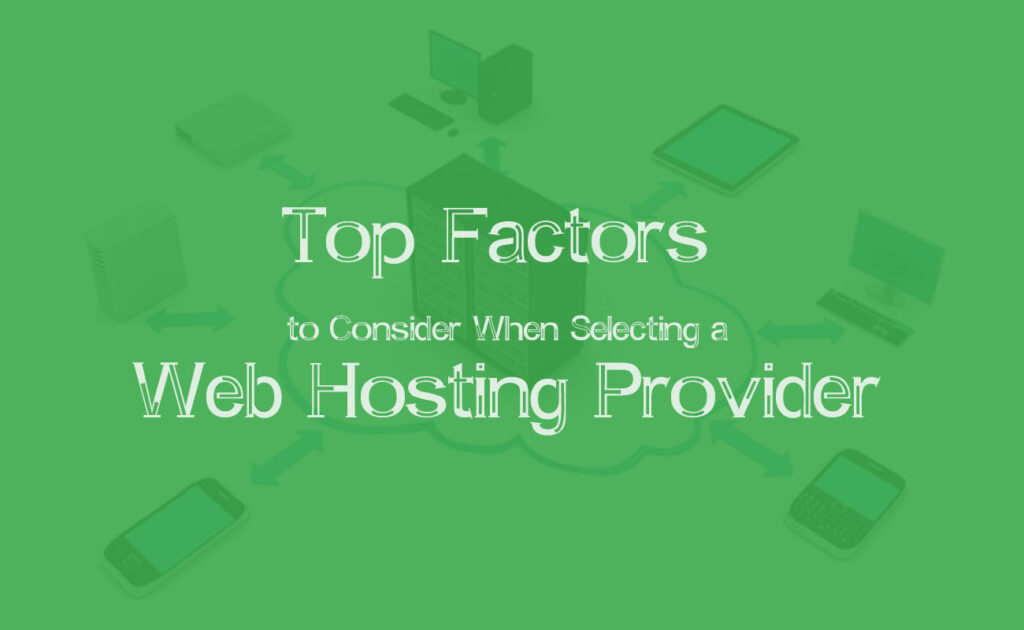Selecting a reputable web hosting provider is a critical decision for any business or individual looking to establish an online presence. This decision can significantly impact the functionality and performance of your website, influencing factors such as site speed, uptime, security, and scalability. Therefore, it’s crucial to carefully consider several key factors when choosing a web hosting provider to ensure that your specific needs are adequately met. In this article, we will delve into the top factors you need to pay attention to when selecting a web hosting provider.
How to Select a Web Hosting Provider
Server Reliability and Uptime
First things first. You can’t afford to overlook the importance of server reliability and uptime in the digital world! Selecting a web hosting provider that ensures reliable servers with high uptime is crucial.
This entails selecting a host whose servers are consistently up and running, minimizing potential downtime that could impact your website’s accessibility. Downtime not only results in lost opportunities for engagement but also negatively impacts SEO rankings. Thus, understanding the downtime impact is an essential step when choosing your web hosting provider.
Server performance plays a critical role in ensuring high uptime rates. A good web host should offer robust hardware that can efficiently manage traffic spikes while maintaining fast page load times. Regardless of how well-designed or engaging your site might be, visitors won’t stick around if it takes too long to load; they’ll simply go elsewhere, costing you valuable business. Therefore, considering server performance during evaluation contributes significantly towards reducing potential downtime.
Another key factor to consider involves redundancy protocols adopted by the web hosting provider. Redundancy refers to backup resources in place (like servers) that take over if primary systems fail – this essentially assures continuous service even during unforeseen circumstances like power outages or system failures. Look for providers offering redundant data centers or cloud-based solutions that guarantee little to no interruption on your end user.
Lastly, don’t just take the word of your prospective hosts about their stellar uptime records – look for tangible proof. Reputable hosts will offer concrete uptime guarantees as part of their Service Level Agreement (SLA), usually expressed as a percentage such as 99% or 99.9%.
It’s essential to emphasize that even with a 99% uptime guarantee, you could still potentially experience up to four days of downtime annually. To ensure reliability, I recommend checking third-party reviews from users who have prior experience with these services before making any commitments. When it comes to reliability and uptime, GoDaddy stands out as one of the top and cost-effective options available today. If you’re considering GoDaddy as your web hosting provider, we strongly encourage you to give it a try. Also, if you’re in search of the latest promo codes of GoDaddy, you can find them by clicking on the provided link.
Site Security Measures
One of these key features is SSL Certificates, which encrypts data moving between your website and visitors. This cryptographic protocol secures sensitive information such as credit card numbers, social security numbers, or login credentials that are being transmitted over the web. Without it, hackers can easily intercept this information leading to severe data breaches.
Another essential component in a hosting provider’s arsenal against malicious attacks is DDoS Protection. Distributed Denial-of-Service (DDoS) attacks overwhelm servers with traffic causing websites to crash or become unresponsive – an event you certainly want to avoid if uptime and availability are important for your business operations. The best hosts will have measures in place to quickly identify and fend off these types of attacks while ensuring minimal disruption to your online services.
Firewall implementation plays a pivotal role in protecting your site from various forms of cyberattacks by controlling incoming and outgoing network traffic based on predetermined rules. A good firewall will block unwanted traffic before it reaches your server thus preventing potentially harmful access while allowing legitimate users through safely. It serves as the first line of defense against unauthorized access attempts, so choosing a host that maintains robust firewalls should be high on your priority list when selecting a service provider.
Lastly, Malware Scanning and Intrusion Detection Systems (IDS) offer additional layers of protection. Malware scanning helps detect any malicious code or software hidden within your website files that could damage its function or compromise visitor information. An IDS monitors system activity for suspicious behavior, alerting administrators about suspected intrusions so they can take immediate action before significant harm occurs. These combined technologies provide comprehensive threat detection capabilities that ensure maximum safety for both you and your customers’ data.
Scalability and Site Growth
As your website garners more traffic and expands its digital footprint, the scalability of your chosen hosting service becomes an increasingly critical factor in accommodating this growing demand efficiently. The ability to scale refers to a web host’s capability to handle increased loads on the server brought about by growth in site visits or content volume.
This attribute is essential for businesses that have ambitious growth projections or expect significant traffic fluctuations due to seasonal trends or marketing campaigns. Looking at it from a technical perspective, effective scalability requires seamless server upgrades and efficient resource allocation. As the load on your website increases, there should be no downtime during these upgrades, ensuring continuous availability of your online presence.
Also, hosting providers need to allocate resources smartly so as not to affect other sites hosted on shared servers adversely. If you intend for your site to grow swiftly and substantially over time, then opting for dedicated hosting might be worth considering despite its higher cost.
Pursuing future-proof solutions when choosing a web hosting provider can make all the difference in smoothly managing increasing demands without compromising performance quality. Managed cloud-based hosts offer one such solution with their virtually limitless capacity and flexible pricing based on usage. They allow easy scaling up or down depending upon changing requirements thereby making them highly adaptive options while being economical too.
Customer Support Availability
Navigating the complexities of web hosting can be daunting, making robust and accessible customer support a game-changer in your digital journey. It’s not just about having someone to call when things go south; it’s also about getting expert guidance on optimizing your site for performance, security, and user experience.
When choosing a web hosting provider, consider their customer support availability as much as you would their server uptime or price point. Support Channels are one aspect to look into when evaluating customer service. Good web hosts offer multiple avenues for reaching out such as email, phone calls, live chats, ticketing systems or even social media platforms.
The more channels they have available, the easier it will be for you to get help whenever needed. In addition to these standard methods of communication, some providers also offer self-help resources like tutorials or knowledge-base articles that customers can use to troubleshoot issues independently.
Response Time is another critical factor. You don’t want to wait hours or days for a resolution if your website goes offline unexpectedly or experiences other technical difficulties.
Quick response times indicate a host’s commitment towards prioritizing client needs and addressing issues promptly. Some hosting services provide estimated response times for each of their support channels so you know what to expect before reaching out.
Technical Expertise of the support staff should not be overlooked either. They need to be capable enough to handle any queries or problems that come up with your hosting account – from simple questions about setting up an email address to more complex topics like SSL certificate installation or database management.
Support Quality is directly related to this: knowledgeable representatives who communicate clearly can drastically reduce downtime and keep your website running smoothly. Last but importantly, ensure there’s an After-hours Assistance option provided by the host which means 24/7 support irrespective of time zone differences between them and you – because let’s face it: websites don’t operate strictly within business hours!
Having instant access to assistance at all times ensures that your website remains functional round the clock, thereby maintaining a positive user experience for all visitors.
Pricing and Renewal Rates
Pricing and renewal rates stand as crucial elements in your decision-making process. It’s important to understand that lower prices often come with certain compromises such as limited services or slower performance.
At first glance, a provider might offer an appealing introductory price. However, you should also check their renewal rates which are usually higher than the initial rate. Hidden costs may creep up on you if not carefully reviewed during your selection process.
The contract length is another element tied closely to pricing. Some providers may require longer-term commitments for those attractive lower prices, locking you in with them for years. This could be risky especially when unsatisfied with their service down the road. Therefore, it’s advisable to start with a shorter term initially until you have fully assessed their quality of service and support before committing long-term.
Refund policies must not be overlooked either while considering the pricing aspects. A reputable host will typically have some form of money-back guarantee policy in place which allows customers to cancel their contracts within a specified period without any penalties or additional charges. Make sure you read through these refund policies thoroughly since they can vary significantly from one provider to another.
Lastly, pay attention to disk space costs and traffic limit charges when evaluating different packages offered by potential hosts. The amount of disk space allocated directly impacts your website’s capacity to store content like videos, images, and other data files. Similarly, most hosting plans include specified limits on monthly network traffic (data transfer) beyond which extra fees apply – this becomes particularly relevant if you expect high volumes of visitor traffic on your site regularly.
Backup and Restore Options
The provision of comprehensive backup and restore options stands as a pivotal element to ensure the safeguarding of your valuable data against unforeseen circumstances or technical glitches. This is where evaluating a web hosting provider’s strategies for redundancy comes into play.
Redundancy strategies aim at duplicating crucial components or operations of a system with the intent to enhance reliability in case one part fails. Hence, it becomes imperative that the chosen host has robust measures in place to handle any potential failures.
One key aspect to consider when examining backup and restore options is Backup frequency. The more frequent the backups, the less data you risk losing should something go wrong. Some providers offer daily backups while others may only do weekly or monthly ones; thus, depending on how frequently your site’s content changes or updates are made, selecting an appropriate backup frequency can save you from significant data loss scenarios. Moreover, versioning capabilities provided by some hosts allow users to recover previous versions of their files which can be particularly useful if you need to revert back due to unexpected issues after an update.
Another critical factor is disaster recovery – this refers to how well a provider can recover your data following a catastrophic event such as server crashes or cyber-attacks. A good web host will have detailed plans in place outlining how they would tackle different types of disasters and detailing expected Restore times (how quickly they can get your site up and running again). It’s vital that these plans not only exist but also they must be regularly tested and updated according to technological advancements.
Lastly, keep note of how user-friendly the restoration process is for clients who might not have much technical expertise. The ease with which you can restore lost information plays a considerable role in minimizing downtime during stressful situations like hardware failure or compromised security incidents.
Additional Features and Tools
As we tread further on the path of web hosting essentials, we encounter a terrain abundant in various additional features and tools that can prove instrumental in not only enhancing your website’s functionality but also in making your management tasks more streamlined and efficient.
The key is to pick those features which align with your business goals and cater to your unique needs. In this context, one must pay attention to email features provided by the host like POP3/IMAP support for downloading emails or SMTP service for sending out emails from your domain.
Possessing SSL Certification is another crucial factor often overlooked at times. An SSL certificate implies that all data transactions between users’ browsers and servers are secure, thereby protecting sensitive information such as credit card numbers or personal details. This assurance builds trust among visitors and customers alike who feel safe while browsing through your site or executing transactions. Hence, ensure the provider you choose offers free SSL certificates.
In addition to securing user data, having robust e-commerce support becomes imperative if you intend to sell products online. Look for a host providing shopping carts, payment gateway integration, product catalog creation facilities, etc., right off the bat without having you break a sweat over the technical complexities involved in setting up an e-store manually. Also, consider whether they offer easy installation of popular content management systems (CMS) like WordPress or Joomla since these platforms make managing websites extremely simple even for non-tech savvy individuals.
Lastly but equally important is domain management capabilities offered by web hosts. A great feature here would be the ability to manage multiple domains under a single account – perfect for businesses planning expansion or bloggers aiming at creating different sites targeting diverse niches. Furthermore, check if there’s provision for unlimited subdomains enabling segregation of different sections within your main site thus facilitating better organization and navigability.
Remember that selecting a web hosting provider goes beyond just storage space and bandwidth considerations; it’s about ensuring optimal performance paired with essential add-on benefits contributing towards the success of your online endeavor.
Frequently Asked Questions
What is the environmental impact of the web hosting provider’s data centers?
Data centers of web hosting providers can have a significant environmental impact. They consume large amounts of energy, increasing the carbon footprint. However, many companies are now adopting green computing practices to reduce this effect. These include using energy-efficient technologies and cooling systems, as well as sourcing power from renewable energy sources. This helps in cutting down emissions and promoting sustainability.
Does the provider offer any training or educational resources for new users?
Some web hosting providers do offer training or educational resources for new users. These could include tutorials, guides, and customer support to help you navigate their user interface and understand the pricing structure. Additionally, they may provide information about scalability options and security measures. It’s important to verify this before choosing a provider.
Does the web hosting provider have a strong reputation in the industry and positive customer reviews?
Choosing a web hosting provider with a strong reputation in the industry and positive customer reviews is important. This indicates provider reliability, good customer support, fair pricing structure, excellent server uptime, and service flexibility. These factors can enhance your website’s performance and user experience.
What is the provider’s policy on data privacy and how do they comply with international regulations?
When choosing a web hosting provider, their data privacy policy should include data encryption to protect your information from privacy breaches. They must also conduct regular compliance auditing and keep up with regulation updates to meet international rules on data protection. It’s vital that they provide transparency in their policies for you to understand how your data is managed and protected.
Can I easily migrate my website to another provider if I’m not satisfied with the services?
Yes, you can migrate your website to another provider if needed. However, it’s important to understand the migration process as there may be downtime risks and possible compatibility issues with new servers. Make sure the new host offers technical support during migration and has proper backup protocols in place.








Leave a Comment
You must be logged in to post a comment.